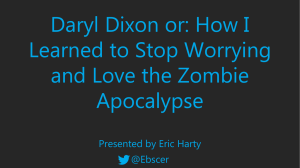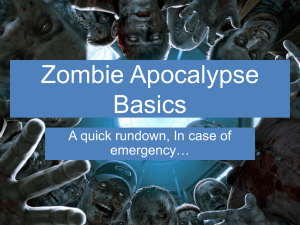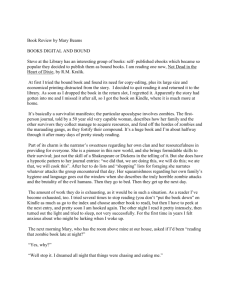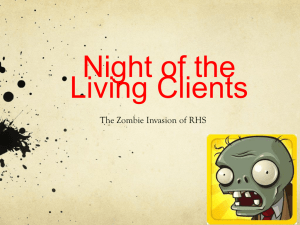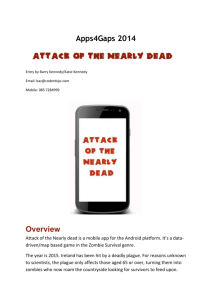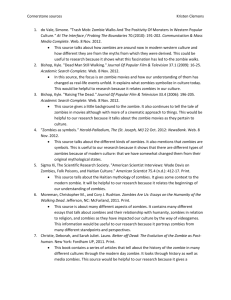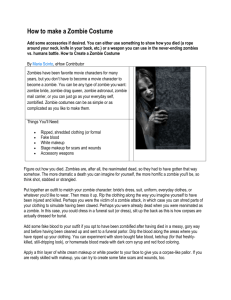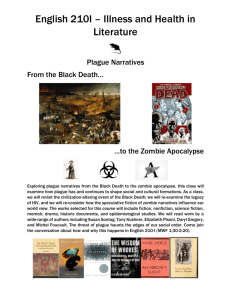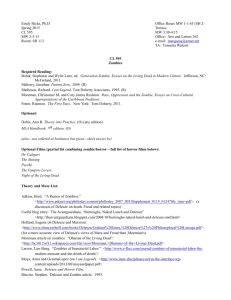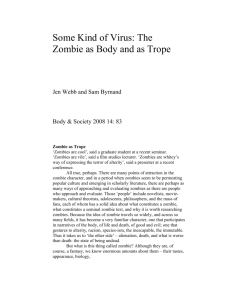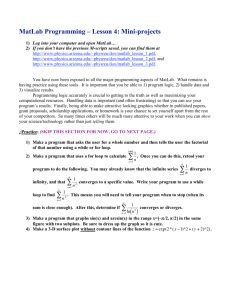Ben Cobb 11/2/12 Scaffolding Project
advertisement
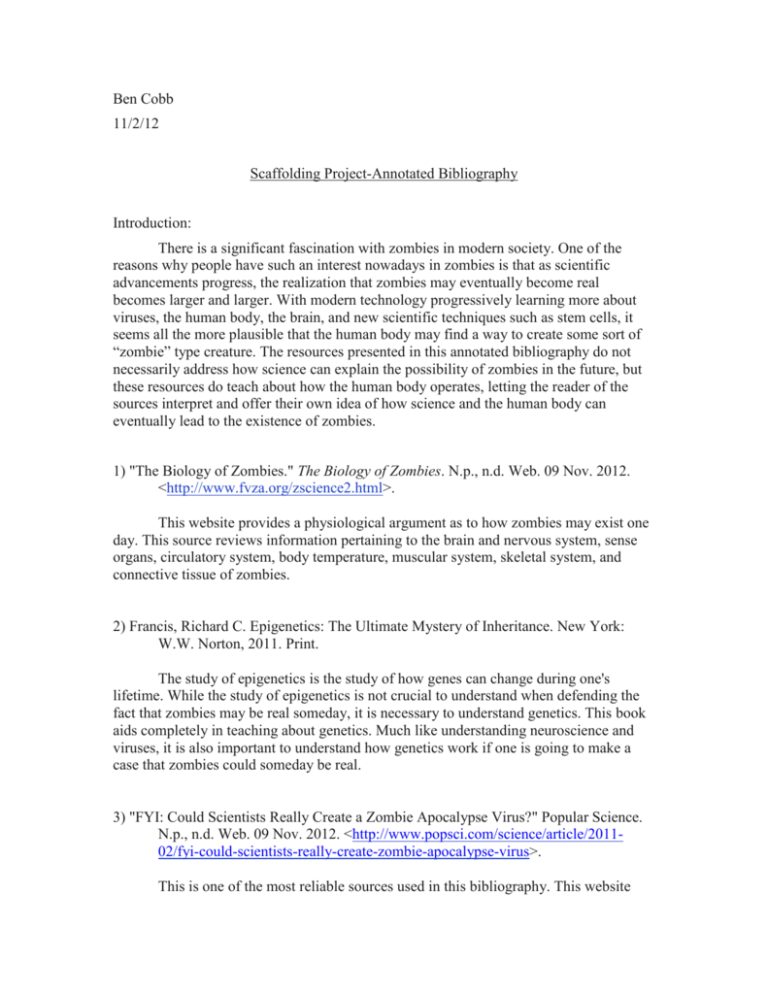
Ben Cobb 11/2/12 Scaffolding Project-Annotated Bibliography Introduction: There is a significant fascination with zombies in modern society. One of the reasons why people have such an interest nowadays in zombies is that as scientific advancements progress, the realization that zombies may eventually become real becomes larger and larger. With modern technology progressively learning more about viruses, the human body, the brain, and new scientific techniques such as stem cells, it seems all the more plausible that the human body may find a way to create some sort of “zombie” type creature. The resources presented in this annotated bibliography do not necessarily address how science can explain the possibility of zombies in the future, but these resources do teach about how the human body operates, letting the reader of the sources interpret and offer their own idea of how science and the human body can eventually lead to the existence of zombies. 1) "The Biology of Zombies." The Biology of Zombies. N.p., n.d. Web. 09 Nov. 2012. <http://www.fvza.org/zscience2.html>. This website provides a physiological argument as to how zombies may exist one day. This source reviews information pertaining to the brain and nervous system, sense organs, circulatory system, body temperature, muscular system, skeletal system, and connective tissue of zombies. 2) Francis, Richard C. Epigenetics: The Ultimate Mystery of Inheritance. New York: W.W. Norton, 2011. Print. The study of epigenetics is the study of how genes can change during one's lifetime. While the study of epigenetics is not crucial to understand when defending the fact that zombies may be real someday, it is necessary to understand genetics. This book aids completely in teaching about genetics. Much like understanding neuroscience and viruses, it is also important to understand how genetics work if one is going to make a case that zombies could someday be real. 3) "FYI: Could Scientists Really Create a Zombie Apocalypse Virus?" Popular Science. N.p., n.d. Web. 09 Nov. 2012. <http://www.popsci.com/science/article/201102/fyi-could-scientists-really-create-zombie-apocalypse-virus>. This is one of the most reliable sources used in this bibliography. This website reviews deeper insights of science, including looking into prions and epidemics of the 1950's. Investigating epidemics when researching whether or not zombies can eventually be real is imperative because most hypotheses say that a zombie break out would take form of an epidemic. 4) "How a Zombie Outbreak Could Happen in Real Life." Io9. N.p., n.d. Web. 09 Nov. 2012. <http://io9.com/5916048/how-a-zombie-outbreak-could-happen-in-reallife>. This website shows addresses why society is so interested in zombies. It concedes this, and then states that people are probably so interested in zombies because they believe, scientifically, zombies might be real. This source reviews how a zombie outbreak could happen. This source is different than other sources used in this bibliography because this source compares it to other scientific entities, such as fungi infections. 5) Park, Alice. The Stem Cell Hope: How Stem Cell Medicine Can Change Our Lives. New York: Hudson Street, 2011. Print. There are many hypothesis about how zombies might come to be, one of them being that something goes wrong with science research creating the first zombie who then infects other people. This book about stem cells reviews the intricacies of stem cells. One of the hypothesis about how zombies will come to be is that stem cell research goes wrong and gives rise to cells that eventually create a zombie. To defend this hypothesis, one must know some information about stem cells, which is what this book teaches. 6) "The Real Science behind a Zombie Apocalypse." Daily Dot. N.p., n.d. Web. 09 Nov. 2012. <http://www.dailydot.com/entertainment/science-zombie-apocalypserabies-video/>. Many of the sources used in this annotated bibliography are leaning toward the reality that a zombie apocalypse could actually happen. This source emphasizes how a zombie apocalypse actually could not happen and supplies scientific information behind that claim. This source is a good source to use to balance out and get both sides of the argument regarding whether or not a zombie apocalypse could happen. 7) Sapolsky, Robert M. Why Zebras Don't Get Ulcers. New York: Holt Paperbacks, 2004. Print. This book is an in depth review of the human body. Sapolsky includes many research anecdotes. Many parts of this book discusses neuroscience. One way to scientifically explain how zombies may be real is from a neuroscientific point of view. In order to do that, a knowledge of the brain must first be known, and that knowledge can be obtained from this book, which is why this book is an important source. 8) "Science Proves the Zombie Threat Is Real." Examiner.com. N.p., n.d. Web. 09 Nov. 2012. <http://www.examiner.com/article/science-proves-the-zombie-threat-isreal>. This source talks about how a fungi took over the minds of a certain kind of ants. This article points toward that fact that a zombie apocalypse could in fact happen similar to when the way the fungi infected the brains of the ants. This source is unique because it parallels a zombie apocalypse to something that actually happened in nature. 9) Zimmer, Carl. A Planet of Viruses. Chicago: University of Chicago, 2011. Print. The main view of how a zombie can infect a person is by transmitting a virus through a bite. This book gives a knowledge of how viruses operate. Understanding how viruses work is imperative if one is going to try and explain how zombies could actually come to exist. 10) "Zombie › News in Science (ABC Science)." Zombie › News in Science (ABC Science). N.p., n.d. Web. 09 Nov. 2012. <http://www.abc.net.au/science/articles/2004/12/09/1260445.htm>. This source is arguably the most in depth source in the annotated bibliography. This website comes from a reliable source on science, ABC Science. This source describes one of the stories of how the zombie hypothesis came to be. This website also includes information from an ethnobiologist at Harvard and includes talking about research that investigates whether or not zombies can be real.
